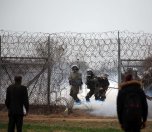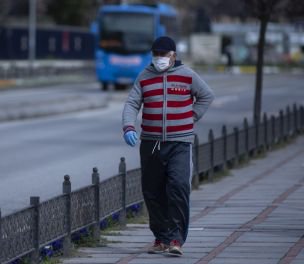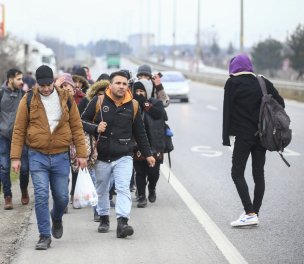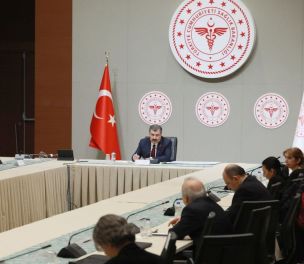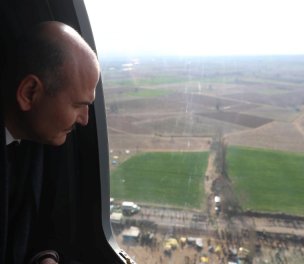PENNED BY ERTUĞRUL KÜRKÇÜ
COVID-19: An Ironical Justification for a Truce on Erdoğan’s Western Front
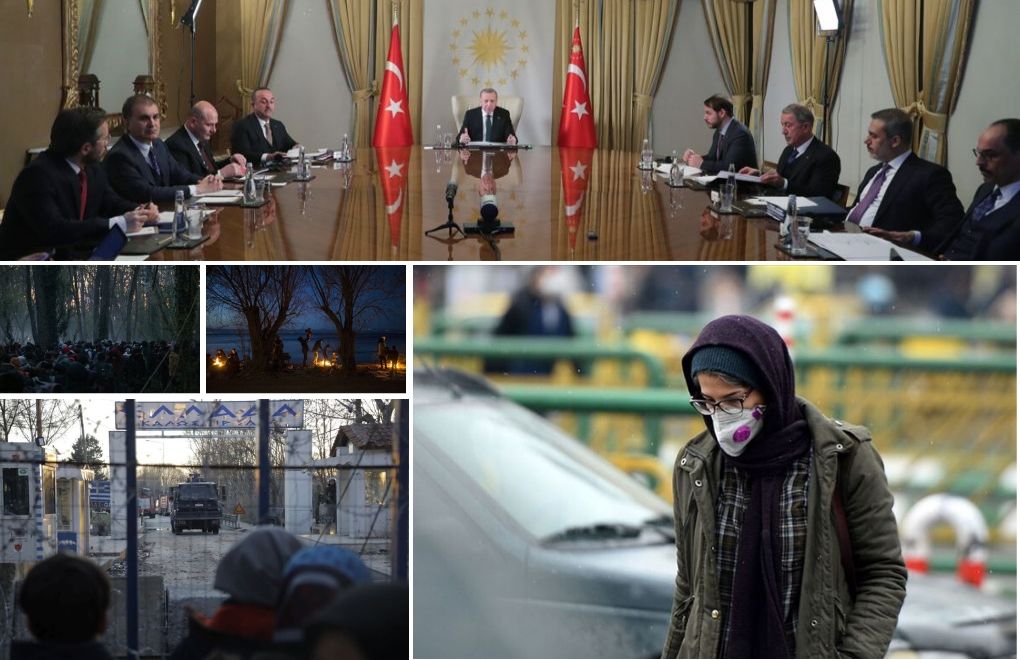
* Photos: Anadolu Agency (AA)
Thousands of refugees who had flooded the banks of Meriç/Maritsa/Evros river in late February after President of Turkey Recep Tayyip Erdoğan's declaration of lifting the barriers on their way to Europe were on Friday forcibly evicted by gendarme troops out of their make shift camps where they were carried on government-sponsored coaches as part of a power game between Ankara and Brussels. [1]
Admitting that they have evicted 5 thousand 800 refugees out of the Pazarkule gate area on Turkey-Greece border "We had to do that under the pandemic [COVID-19] risk," told Turkey's Interior Minister Süleyman Soylu.
"Yet they [Europe] should not fool themselves that it's over. When the risk will be eliminated, we will not say 'no' to whoever would like to return to Pazarkule. This was simply a humanitarian measure under health concerns," he challenged.
The refugees are reportedly sent to repatriation centres in nine different cities and they will be quarantined for 14 days for possible COVID-19 infection. The refugees shared video-clips of the Turkey's gendarmes torching their tents to close their way back to the make-shift camps where they had sheltered during the one month desperate stay in the open.
Indeed, the government of Turkey had, on March 18, the day after the virtual summit between the leaders of France, Germany and the UK with President Tayyip Erdoğan, closed the borders with Greece and Bulgaria, EU's eastern gates. The closure had come "as part of [Turkey's] measures against the novel coronavirus," the state-run Anadolu Agency (AA) reported. [2]
Yet, just three weeks before the closure, the government of Turkey, refueling past disagreements with the EU, had unexpectedly opened the same borders in spite of a EU-Turkey migrant deal already in force since March 20, 2016. [3] Thousands of refugees encouraged by official promises of impunity had in a few days flooded the banks of Meriç/Maritsa/Evros river and of the Aegean shores on government-sponsored coaches inciting fears of a new refugee wave across Europe.
The background
A report by the Crisis Group [4] - a liberal peace-seeking international initiative pioneered by former PM of Sweden Carl Bildt - related Ankara's decision with a desperate search for covering up Erdoğan's embarrassing concessions to Russia after a bloody stand-off to stop the progress of Assad forces in the Idlib province - the last rebel stronghold in Syria with considerable Turkish backing.
"Ankara's decision came just an hour after news broke that at least 34 Turkish soldiers had been killed in Idlib. It was the highest death toll the Turkish military had suffered in a single attack in the last two decades, and it exacerbated fears that intensified combat in Idlib would push nearly one million more Syrians into Turkey to join the four million refugees the country has been generously hosting," the Crisis Group report reads.
"Some observers say the government removed the border restrictions to deflect public attention from the military's losses in Idlib, where it has reportedly deployed some 20,000 soldiers in an effort to contain the fighting. For two days after the attack, Ankara blocked Internet users' access to Twitter, Facebook, Instagram and YouTube, all widely used social media platforms in the country. More than half of Turkey's citizens, or 52.7 percent, oppose the military intervention in Idlib, while 40 percent support it, according to an early March survey that a polling company in Turkey conducted after the 34 soldiers died," the report says.
It was "far lower than the popular backing (which ran as high as 80 percent) for Turkey's previous three operations in northern Syria, carried out between March 2017 and November 2019."
However, the report concludes that Ankara's motive was deeper than gaining a quick public relations victory: "Ankara calculated that the move would pressure the European Union into supporting its course in Idlib and secure additional funding for the Syrian refugees in Turkey. It also aimed to compel the EU to meet its commitments under a March 2016 agreement by which Turkey limits the number of migrants crossing into Europe in exchange for refugee aid and other promises."
Ankara's migrant 'deployment' on the border area
In a televised speech on March 2, Erdogan justified his decision to suspend the migrant deal as a response to EU's lack of interest for resettling Syrian refugees in "safe zones" inside Syria. In a phone conversation with President of France Emmanuel Macron, he said Turkey wanted "concrete solutions, proposals and support." [5] Nevertheless, he had to receive mostly widespread accusations of "using refugees to blackmail Europe and calls for Ankara to respect the 2016 accord with the EU."
Some EU ambassadors to Turkey conceded "the EU would have to cough up more money for Turkey to keep a lid on migrants reaching Europe" putting pressure on allies and potential donors to help Turkey host its current refugee population and prevent a fresh influx from Syria's Idlib. But as most analysts predicted opening the gates "would backfire." [6]
"We have rather strong reasons to believe that (migrants) were not only let through, but they were even pushed, encouraged to leave, and it was all planned," a European diplomat, speaking on condition of anonymity, told Reuters.
Inside Turkey, only the Peoples' Democratic Party (HDP) openly critiqued Erdoğan's refugee game as a violation of their rights. HDP's Immigration and Refugees Commission spokesperson Gülsüm Ağaoğlu in a written statement denounced the ruling Justice and Development Party (AKP) of Erdoğan with "using refugees as bargaining chips. Refugees are being used as a political tool and they end up in the hands of human traffickers," she told. [7]
A 'cynical' game with and against Russia
Commenting on Erdoğan's moves from a strategical perspective, "Ankara wants the EU to do more to pressure Russia to stop supporting the Syrian government and agree to a ceasefire, and for the EU to provide more financial support to cope with refugees," says Luigi Scazzieri, a research fellow at the Centre for European Reform. [8]
Scazzieri's perspective is echoed by the US-based Foreign Policy magazine yet in a more Euro-critical tone: "The West could raise the costs of Russia's intransigence by enforcing a no-fly zone over Idlib. Backed by NATO air defense systems, Turkey could deter Russia. And by providing meaningful support at a time when Turkey is vulnerable, the West would gain critical leverage to demand respect for democracy and protection for the Kurds in Syria's northeast," analyses [9] FP's Muhammad Idrees Ahmad.
"Turkey's use of refugees to command Western attention is cynical. But without it, the West refused to care about the Syrian conflict or its impact on neighboring states. When a no-fly zone was demanded by Syrians in 2012, the West balked. Now, German Chancellor Angela Merkel and Dutch Foreign Minister Stef Blok are calling for a safe zone in Idlib (...) It is tragic that fear has ultimately proved a more effective motivator than empathy. Had the West abided by its own human rights values, its ministers wouldn't be quaking today at the sight of refugees," he concludes.
Back to the negotiations
Erdoğan, as soon as having unleashed the barriers on the Syrian refugees' way to Europe, rushed to Moscow on March 5, expecting to seal a favourable truce in Idlib with Russian leader Vladimir Putin. Yet, in spite of extreme material damage and human losses Turkey had inflicted on Syria's military machine, he had to swallow previous pledges of "destroying Damascus down to earth", "bringing war on Syria" unless Assad forces retreated to their previous positions as agreed in the "2018 Sochi consensus" and left the control on the major M-5 highway to the rebel forces. Trapped between accepting the advances by the regime forces in Idlib and seal the truce as imposed by Moscow or engaging in an all-out war with Syria and Russia, Erdoğan stepped back and sealed the truce.
The slight shift in the balance of forces in Russia's favour in Syria inevitably attracted the US attention to Idlib and Washington heard the alarm bells rang by Turkey. Some three million or more Syrian refugees are being "deliberately" pushed by Russia toward Europe, US diplomats warned.
The refugees were "jammed together in about half of the province of Idlib [in northwest Syria], many of them very close to the Turkish border, who risk coming across, destabilising Turkey, and perhaps moving on to Europe," told James Jeffrey, US President Trump's special envoy for Syria. [10] The refugees were being driven out by Russian and Syrian regime forces, but Russia was in charge, the US diplomats indicated.
US intervention in the EU-Turkey migrant dispute and increased US emphasis by the senior diplomats on the part played by Russia in the ongoing stand-off between Turkey and Europe in a way helped calm the tone down on both sides of the dispute.
Turkey and EU continued to preserve their political positions and lines of thought, but their vocabulary was not as challenging: "There was a demand by the Turkish side to have a very close look at the 'statement' to see where we have and have not been successful ... this is a good start for further discussions," European Commission President Ursula von der Leyen said [11] after meeting with Erdoğan in Brussels on March 9.
"We have different opinions on different things and that is why it is important to have a frank and open dialogue," EU Council President Charles Michel added.
However, Erdoğan put greater emphasis on the meeting with NATO secretary general Jens Stoltenberg earlier in the day: "Our allies should display their solidarity with our country," he said. "It is very important that the support we demand is met without any further delay," he added.
"NATO will continue to support Turkey with a range of different measures. This includes defensive missile systems, helping to protect Turkey against threats from Syria. We also support Turkey with air and naval presence," Stoltenberg said, referring to previously agreed assistance.
Erdoğan, on the same day, had said he would stop migrants crossing the sea to Greece for safety reasons, raising hope he was preparing to back down. He also agreed a new Syria ceasefire with Russia, raising hope that more refugees would not be pushed from Syria to Turkey.
COVID-19 outbreak and suspension of Europe-Turkey dispute
On March 10-11, Turkey admitted the first death from the new Coronavirus, which has led to a dramatic change in the country's domestic and international agenda since then. The epidemic had already turned into a pandemic and heavily struck West Europe too, leading Turkey close its borders to most European countries. Finally, the European summit scheduled during Erdoğan's tour to Brussels for March 17 in Istanbul, between Erdoğan, France's Macron, Germany's Merkel, and UK's Johnson turned virtual and was carried on the Internet.
"Joint action against coronavirus, resolution of Syria crisis, humanitarian assistance to Idlib, refugee flow, developments in Libya, the situation in the EU and our relations with the EU," were the issues discussed at the meeting, Foreign Minister Mevlüt Çavuşoğlu tweeted on March 17, following the video-conferencing session.
Following the meeting, Merkel said they would provide 125 million euros for the Syrians in Idlib. She also signaled Berlin's green light to launch talks on upgrading the Customs Union with Turkey. European leaders called on Erdoğan to ease the pressure on the Greek border as well.
"Germany has earmarked 25 million euros [USD 27,498] plus 100 million euros [USD 109,994] for humanitarian assistance, and this must now quickly reach to the people," she said, referring to millions of displaced Syrians who moved near the Turkish border due to intense attacks by the regime of Syrian President Bashar al-Assad in recent months.
Chancellor of Germany praised the March 5 agreement between Turkey and Russia to restore a fragile ceasefire in Idlib, after weeks-long clashes between the conflicting parties. "We very much welcome a temporary ceasefire," Merkel said, but she also underlined the need for a sustainable ceasefire and steps to revive the talks for a political solution to the conflict.
Merkel said the leaders have also discussed the migration issues and the 2016 EU-Turkey refugee agreement, during the video conference call. "We have expressed our willingness to offer more financial support if necessary," she said, adding that they were also aware of Ankara's expectations in upgrading the EU-Turkey Customs Union.
Merkel said in the conversation that Erdoğan "has insisted his country will remain a member of NATO. We have also expressed our support to it and we welcomed it." [12]
A day before the summit HDP spokesperson for refugees Gülsüm Ağaoğlu had called on the government "to intervene in to stop the plight of the refugees who were pushed to the border areas by the government during the dispute and implement measures to protect them from the COVID-19 pandemic and see to their resettling."
Having started amid tumultuous threats and claims exchanged between the European and Turkish leaders, the last refugee crisis between Turkey and EU quietly extinguished after a two-word declaration on March 18 by the Turkish government: "Borders are closed". Hundreds of refugees who had left everything they had for the false hopes invoked by the government had to return to nowhere battered, redisplaced, gassed and the loved ones killed by Greek border guard fire or drowned in the Aegean...
The refugee crisis of the states involved in the last dispute is postponed until the eruption of a new one depending on their particular interests in the future. But the refugees' crisis has been further aggravated as they have disappeared out of the public eye and with almost no protection against the new coronavirus.
The pandemic, while killing the neglected subjects of the nation states including Turkey, ironically saves Tayyip Erdoğan from another embarrassment and provides him and his European adversaries the justification for burying axes out of a cynical war on the Western Front - a war engaged in by weaponising the plight of the refugees who have been paying the price of miscalculated imperialist plans for a forced regime change in Damascus. (EK/SD)
[2] https://www.aa.com.tr/en/turkey/turkey-closes-border-gates-with-greece-bulgaria/1770793
[5] https://www.bbc.com/news/world-europe-51707958
[7] https://anfenglishmobile.com/human-rights/the-akp-uses-refugees-as-a-political-tool-41957
[10] https://euobserver.com/migration/147695
[11] https://euobserver.com/migration/147681
[12] https://www.hurriyetdailynews.com/germany-pledges-125-million-euros-for-syrians-in-idlib-153078
The long and hot summer ahead
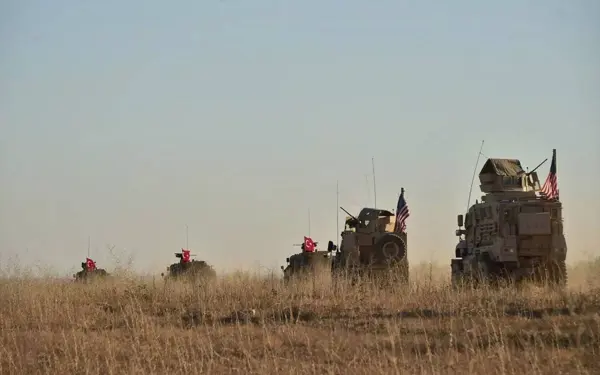
'Shamelessness'
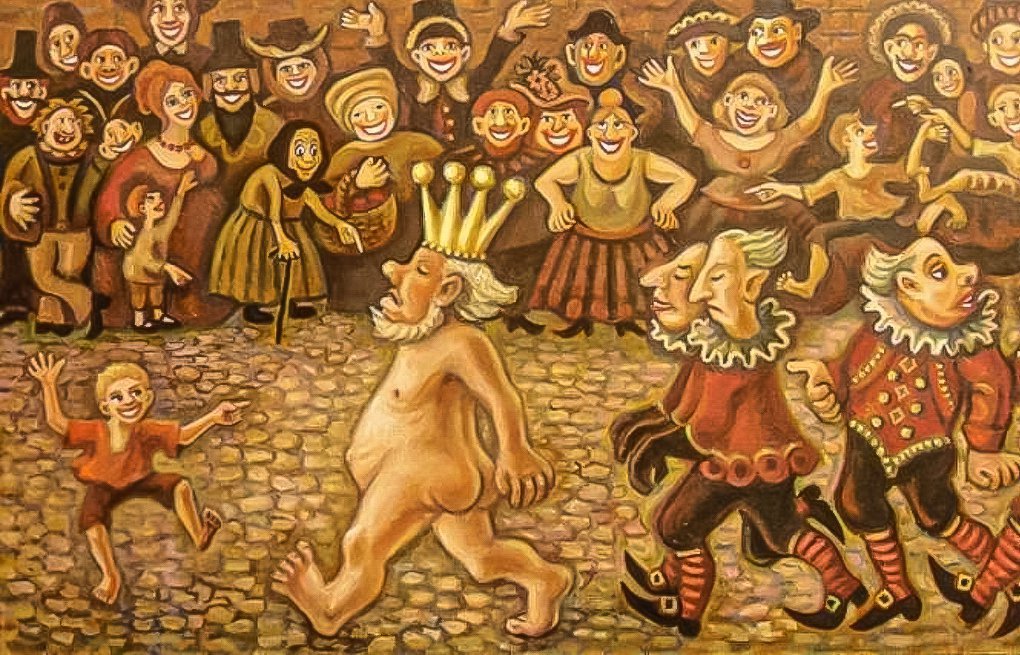
LEFT TIDE IN LATIN AMERICA-III
The new task: 'To contribute the reintegration process, to recover the lessons of the Cuban revolution'
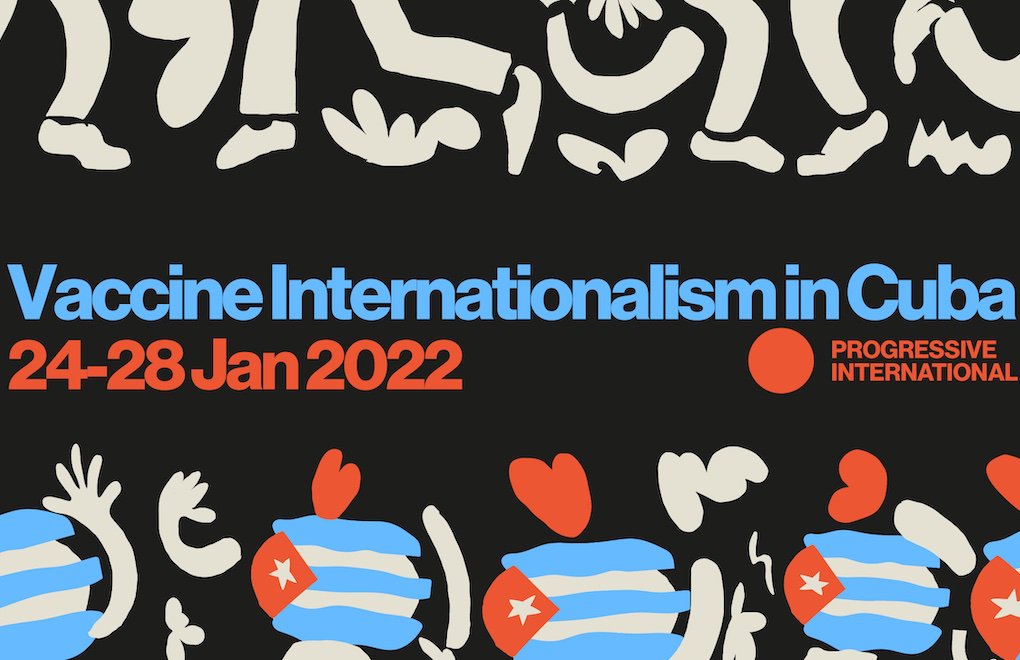
LEFT TIDE IN LATIN AMERICA-II
An International to accompany the continental rise of the Left

LEFT TIDE IN LATIN AMERİCA-I
David Adler: "A new vision that is feminist, ecologist, and pluralist"
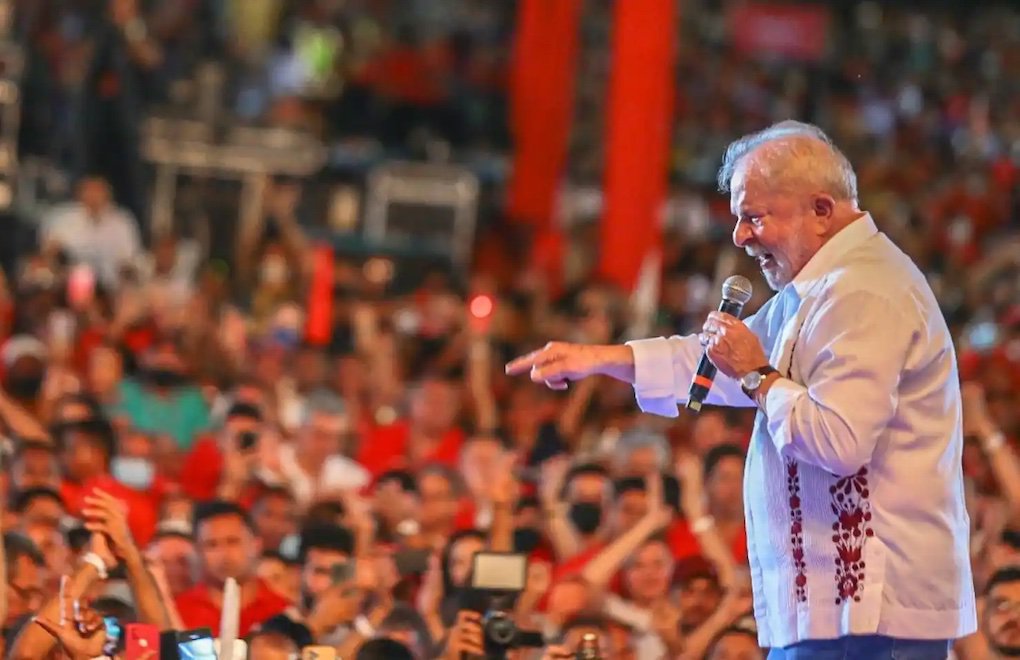





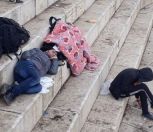
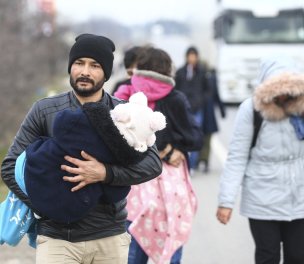
scns.jpg)
